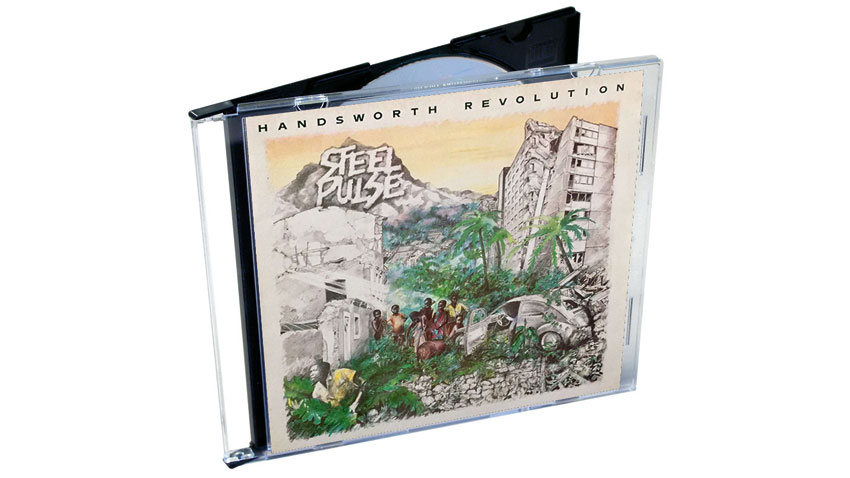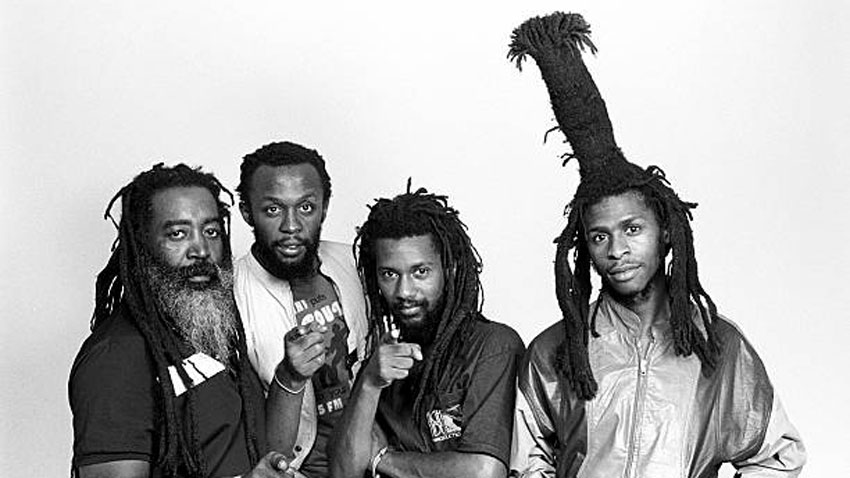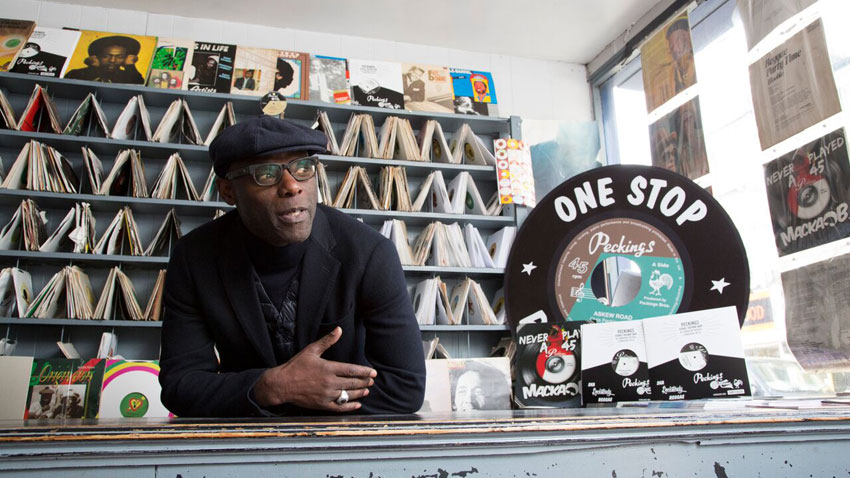Classic album: Mykaell Riley on Steel Pulse’s Handsworth Revolution
Looking back on the greatest British reggae album of all time

Want all the hottest music and gear news, reviews, deals, features and more, direct to your inbox? Sign up here.
You are now subscribed
Your newsletter sign-up was successful
Exactly 40 years ago the founding fathers of UK bass culture were in Bob Marley’s studio watching an engineer kick a spring echo. It may have raised a chuckle, through a cloud of smoke, but the sound was no joke. This was dub science - a relatively new dark art of studio sound manipulation that gave body, weight, timelessness, pressure and power to your sound.
Steel Pulse, a group of super tight musicians from Birmingham, were recording their debut album, Handsworth Revolution. Holed up in Island Records’ London studio (nicknamed “The Fallout Shelter”), surrounded by gear left over from Marley’s sessions, the young posse set to work with something to prove. They were at the end of a cycle - generally, reggae was considered over. And British reggae? C’mon. The only other band on the radar at the time was Aswad, and they were signed to the same label, so what chance did Steel Pulse have?
“We didn’t fit in at the time,” says founding member, Mykaell Riley, who, along with lead vocalist David Hinds, guitarists Selwyn Brown and Basil Gabbidon, bassist, Ronnie McQueen, drummer Steve Nisbett, and percussionist Alphonso Martin, made up the group. “Nobody thought it was authentic reggae, no-one cared about anyone outside London, and our main competition was on Island Records! We knew we had to make our identity - around the music, lyrics, performance, and production - reflect Britishness.”
This was a time of dub architecture in the UK that we take for granted now. Where once ungainly pipes and plates made mesmerising reverbs and echoes, now sits a plugin. But this was the era of experimentation, with pioneers like Steel Pulse getting in the trenches and earning their stripes, and founding a great deal of the sonic language that runs through the story of British music today. Handsworth Revolution would go on to be regarded as the greatest reggae album ever by a UK act, and one of the first on these shores to take the Jamaican sound and put it through the British ringer: a practice countless musicians would continue, right up to grime and dubstep. Here’s that album’s story. Lest we forget.

Handsworth Revolution
“This is the signature track off the album. It’s the song that really tells a story of who we are, where we’re from, and what we were trying to do, so it had to be our opening track.
“Getting the sound right was really challenging. One of the comments from back in the day was that, ‘It’s reggae, but not reggae… It’s not the Jamaican sound’. We were trying to capture what we were doing on the road, live. It was reggae, but from a very British experience, too.
“You wouldn’t hear this type of thing on commercial radio. We never looked to the wider music charts like the top 40 or BBC. Reggae was not in the charts, rock was dying out and commercial music was filling it out.
Want all the hottest music and gear news, reviews, deals, features and more, direct to your inbox? Sign up here.
“Our charts were the pirate radios and the sound systems. We’d read Blues & Soul magazine or Echoes. We didn’t look to NME or Melody Maker.
“That said, we wanted to be on Top of The Pops - if we could get there, that would be our launchpad. The track Ku Klux Klan, from later on in this album, was gonna be the one to do that, but then they decided to ban it. We knew we were onto the right path by challenging the BBC.”
Bad man
“These songs had been on the road for some time in their own shape before we got into the studio. We wanted tracks to sound like they had, live, but now we are taking advice from the professionals behind the desk. That involved discussions about tempo and the energy.
“Take Bad Man - that was an upbeat track for us. The exciting thing about that was taking our drummer, Steve Nesbitt, who had a soul and funk background, and translating his sound into a reggae production. His drum fills and so forth was something that was discussed across each track - the feel, and getting the feel of the drums right, was the thing.
“We were all early to mid-20s back then. Steve was the oldest person in the band at 29, and we thought that was ancient. He was the only person in the band who had dreadlocks [laughs]. He was a soul drummer who had dreadlocks. It was very perplexing at the time.”
Soldiers
“The subtext of the lyrics is, ‘Who are the soldiers?’ Firstly we’re in a battle, and that battle is with the government and the state. We are the soldiers - the community are the soldiers, and we are fighting in an everyday way.
“This track was us translating that everyday fight, communicating that struggle and reflecting backwards, historically, to the fight of the black community. The battle is ongoing.
“What we were doing back then was a type of music that tied into a cultural, social, and political experience that was unique to this country. It would go on to inform other parts of the world, as well. From an academic standpoint that history isn’t really understood. It’s not written down in a way that a wider audience can understand it. There are not enough books about it. We’re a bit blasé about Britain’s contribution to reggae culture. We need to acknowledge what we’ve achieved. We need to identify how important the 70s were for reggae and music culture in the UK.”
Sound Check
“This was more of a dub track. It’s a live track. It’s a fun, dance track.
“Our drummer, who was always a funk drummer, changed the feel of the rhythmic elements of our music.
“In terms of the production, it was about trying to inject the energy we had live when we were onstage, and see if we could make that work with the right production choices.
“Back then, we were very much relying on the engineers. We would reference to other records, but the structure, arrangements and basslines didn’t apply in the same way.
“We have to mention sound system culture. It was big back in Birmingham then. It’s often overlooked that [Birmingham] had the highest number of the Jamaican community in one location, which meant the culture was more pronounced and vibrant than in other places in the UK. Londoners used to come down and refer to it as ‘country’, like they were going out of the main city, Kingston, into the country where things are rawer and more authentic.
“Back in Birmingham, in the late 70s, if you were gonna enter into the sound system dance, you had to be on it - absolutely on it. When I say ‘on it’, I mean you had to sound like the sound systems. You were as powerful, as tight. You dubbed your music live. You had perfect harmonies. If you had a percussion section, you did that live. Everything had to reflect the music on the turntable.”
Prodigal Son
“This was what we called the ‘lightest’ reggae tune on the album, because of the arrangement.
“Lyrically, the message was that we’re all children of Africa and we’re coming home, but also we are children of Britain, and we need to identify with that.
“It’s important to understand the lyrics within the context of the time. It’s about the identity crisis within the black community at the time.
“Are we British? We’re being told to get out and leave by Enoch Powell and the Thatcher government. Are we Jamaican? What does that mean? We’re being told we’re not authentic reggae musicians. We don’t have authentic Jamaican accents.
“We’re trying to deal with all that in the lyrics. This song is about finding our own identity. It’s as much about the individual as it is about the wider community.”
Lyrically, the message was that we’re all children of Africa and we’re coming home, but also we are children of Britain, and we need to identify with that.
Ku Klux Klan
“Often in the lyrics in Steel Pulse, we’re using larger references, but trying to make them resonate into the British experience - the Klan is an American thing, but we make it have a local perspective.
“The opening lyrics, ‘Walking along just kicking stones...’ is about just being you, a young black male, minding your own business, and then being confronted by some form of racism; be it the National Front, the police, or even an audience member. Often our audience attracted the National Front at the time. We had punks who were very right-wing and fascist turning up to our gigs. So our lyrics were really simple and easy to understand, but the subtext was a direct message to what was going on.
“The idea was that we were a British reggae band, and we were embracing that. Then it was a case of, ‘What does that mean, sonically?’ We had to translate our sound to an audience who’d never seen us, and to radio, which was something we didn’t understand back then as we were all about the bass.”

Prediction
“This track stood out as the one that challenged what reggae should sound like, in our experience, while still representing the Steel Pulse sound. It has an acoustic sound. We wanted to take reggae in a different direction.
“We’d been playing these songs for some time, but when it came time to produce them, we had to find a new way to make them gel. In the studio there were all these new guitars to play with. From a young musicians’ perspective it was great - we’d never had such a range of guitars. We brought a Spanish guitar in. We had more tools to get the sound.”
Macka Splaff
“It’s funny - this was a comedy track onstage. It was initially born out of being the final track of the set where you’d introduce the members of the band. It’s a fun track. It’s about the joy of being involved in the music. It’s about escapism. And it’s also about acknowledging who we are as individuals in the live space.
“Translating that to a studio production was one of the funnier tracks to do, and challenging, because we’re not onstage. Going from playing this after an hour onstage - and feeding off a live audience - to playing this in the studio was cold.
“We performed most of the song as a rhythm section, live. Then when it came to arranging it as a studio performance, it was very different. Live, we could wind it up and direct each other with hand signals if we wanted a few more bars in.
“In some cases the material on this album was a year old by the time we came to recording this. We were already half way into completing the second album when we recorded the first one.
“Our audience, who grew very quickly after we were signed, probably only experienced us for the first time via the album. That gave us a certain license to change these songs into the ways you hear them here.”
For more history, music and activism, head to steelpulse.com.


Future Music is the number one magazine for today's producers. Packed with technique and technology we'll help you make great new music. All-access artist interviews, in-depth gear reviews, essential production tutorials and much more. Every marvellous monthly edition features reliable reviews of the latest and greatest hardware and software technology and techniques, unparalleled advice, in-depth interviews, sensational free samples and so much more to improve the experience and outcome of your music-making.
